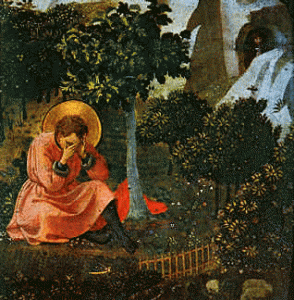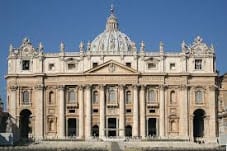Are you suspicious of God? This is a rather strange question to open an essay, especially one written by a believer. It seems to be the question of the skeptic. If we are honest, we will admit that, yes, on some level, I am suspicious of God. That level of honesty is difficult because it shatters the image each of us has of himself as a Christian. Nevertheless, it is there. God has willed it (even if only permissively) as an effect of the Fall. We have each inherited from Eve a suspicion that God might not totally have our best interest at heart. Satan placed the question of whether God was holding out on her in her heart and its echoes have been heard in the hearts of her progeny ever since.
There is further proof that suspicion is part of our default condition. In those children whom He has adopted in Baptism, God has placed the remedy—Faith. Without it we will eternally go on questioning God’s motives. With it, suspicion is wiped away. The point is that Faith is not natural, not something we can obtain or, once we have it, even increase on our own. It is beyond our natural capacities and is totally supernatural. Upon hearing of the power of Faith (Lk 17:5, Mt 17:20), the disciples do not say “Lord we will try harder to believe”, but “Increase our Faith.”
Despite its supernatural origin, it is nevertheless a habit infused into our souls that we have the power to use. But in order to use it properly, we must become more aware of its mode of operation.
Natural vs Supernatural Faith
Oftentimes we equate supernatural Faith with human faith and think it simply means trust. Like supernatural Faith, natural faith is a form of belief based on trust. We might have faith that a pilot has been properly trained and therefore get on a flight even if we are anxious about flying. Natural faith is based on reasons—the airline would not want to put inexperienced pilots in the air because it is too great of a liability, we know someone who is a pilot and he went through years of flight school, the FAA unlike most government agencies is effective in monitoring airlines, etc. Ultimately there is a leap of faith involved, but the leap is based upon solid reasoning.
Supernatural Faith is not quite the same. Like natural faith it involves first believing someone (trust) before believing in his testimony. But with Faith there is no leap of faith involved. God has picked us up and placed us across the chasm of mistrust and doubt. He has given us a share in the trust that Christ had in the Father. Now, Christ did not have Faith because He had the Beatific Vision from the moment of His conception, but nevertheless He merited for us the foundation of Faith—trust. The problem is that we often put the cart before the horse and focus on what is revealed before we address the issue of trust in the Revealer.

There truly is no such thing as an “intellectual conversion”. You can think all of the doctrines of the Faith are reasonable and still not have Faith. You simply have right opinion. That is a good thing, but it is not Faith. Faith consists first in trusting the Divine Person and then, knowing that He cannot deceive or be deceived, you believe everything that He says.
There is a great recent example of this in an interview Jordan Peterson gave. Anyone following him over the last few years will see that he is coming to think like a Christian. He even admits to seeing Christ as an important historical figure who lived. But he does not, and never will be able to, convince himself that Christ lives. He still sees Him as living in the past and only influencing today through some natural progression of His doctrines. This is natural faith, but, as I have said previously, one does not graduate from natural faith to supernatural Faith. Pray that he receive the gift of Faith.
Disposing Ourselves to Receive Faith
We can detect our own tendency to naturalize Faith by how we respond to the interaction between Christ and the Apostles when He tells them it was because of little Faith that they could not cast out the demons (Mt 17:20). Most of us read that as a rebuke. But how can He rebuke them for something that they don’t naturally have? Instead He is making them aware both of the power of Faith (it can move a mountain) and their need to ask and ready themselves to receive an increase (Lk 17:5).
Because Faith is the foundation of the spiritual life and thus the deeper the foundation the taller the edifice that can be built upon it—but we said it was a gift and thus we cannot strictly speaking increase our faith we can ask for more faith and do certain things which dispose us for a reception of stronger Faith. As St. John Henry Newman says :
“…with good dispositions faith is easy; and that without good dispositions, faith is not easy; and that those who were praised for their faith, were such as had already the good dispositions, and that those who were blamed for their unbelief, were such as were wanting in this respect, and would have believed, or believed sooner, had they possessed the necessary dispositions for believing, or a greater share of the them.”
St. John Henry Newman, Dispositions for Faith, Sermons Preached on Various Occasions.
There are two things in particular we can do to dispose ourselves to receive an increase in Faith. First and most importantly is to ask. Admit your unbelief and ask for an increase in Faith (Mk 9:24). Second, exercise the virtue of Faith. When you exercise the “muscle” of faith through its exercise, you will be ready for the Divine Spotter to add more weight on the bar of Faith. The three exercises that are particularly helpful are:
- Make acts of faith, especially by reciting the Creed. But also in general by affirming that you believe any particular doctrine you happen to come across in your spiritual reading or discussion. I find this practice particularly helpful during homilies that otherwise would not move me.
- Study the Faith. When you also understand you are able to make a firmer assent to what is believed.
- Teach the Faith or openly profess the Faith in front of others. This requires first a trust in God that He rewards those who proclaim Him and then a trust that He has spoken truthfully.




